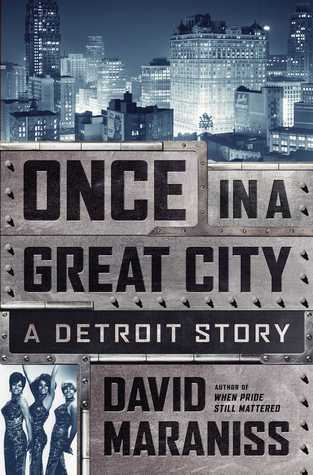Once in a Great City: A Detroit Story David Maraniss (2015)
I’ve been reading a lot of Detroit histories as background for a novel I’m currently writing. This is my favorite.
Journalist David Maraniss combines deep research with eminent readability as he describes Detroit in a narrow but critical slice of time—from the fall of 1962 into the spring of 1964. In an Author’s Note, Maraniss confirms that “the city itself is the main character in this urban biography” (xiii). But a dozen or so of Detroit’s prominent inhabitants are featured also, their stories woven through the narrative, their characters and personalities tellingly revealed: labor leader Walter Reuther, auto exec Henry Ford II (“the Deuce”), Aretha’s father the Rev CL Franklin, mayor Jerome P Cavanagh, and Motown founder Berry Gordy, Jr, among others.
Maraniss also interviewed many ordinary citizens. I found the remembrances of Robert C Ankony, as transcribed by Maraniss, particularly effective in evoking Southwest Detroit, which was smack up against the border with Dearborn. He describes the smokestack smell from the foundry at the River Rouge Complex and the look of the storefronts on West Vernor and Michigan. Ankony was a 14-year-old truant from school on the fateful day of November 9, 1962, when he became an eyewitness to the massive fire that burned the Ford Rotunda to the ground. The Rotunda was a fabulous exhibition space that was one of the five top tourist attractions in the US at the time, and its destruction, which opens Once in a Great City, portends coming troubles in all sectors of Detroit life.
Complete with maps to help you visually locate key sites from the period, Once in a Great City chronicles the battles for civil rights, the marketing of the first Ford Mustang, and Detroit’s failed bid to host the 1968 Olympics. National events form a backdrop: the assassination of JFK, the rise to prominence of MLK, the Great Society promises of LBJ. These three men paid attention to Detroit in the early Sixties because it was then still a truly great city.
The Origins of the Urban Crisis: Race and Inequality in Postwar Detroit Thomas J. Sugrue (1996, with a new preface by the author in the 2005 edition)
In academic research about 20th-century Detroit, everything starts with this classic social history, which breaks through previous assumptions that a “culture of poverty” and the Great Society programs of Lyndon Johnson created urban decline in Rust Belt cities such as Detroit. Thomas Sugrue amasses meticulous details to construct instead a picture of deindustrialization and of discrimination in employment and housing that led to an impoverished underclass of African Americans hopelessly stuck in a deteriorating urban landscape.
The research basis of this book is astounding. Sugrue went digging in numerous archives, drilling down to the level of newsletters of local neighborhood associations and minutes of city commission meetings (as just two examples) to extract the story of what really happened in Detroit in the 1950s and 1960s. He didn’t rely just on newspaper accounts or police reports, which were often skewed to downplay racial violence, redlining, and the shenanigans of the captains of industry. While we may assume that the 1950s were a period of unalloyed American prosperity, Sugrue’s data demonstrate that the societal prejudices of the 1950s and the previous decades led directly to massive unemployment, infrastructure decay, and white flight to the suburbs in mid-century and late-century Detroit.
The Origins of the Urban Crisis is not a quick read, but for anyone who wants to fully understand Detroit—and many other major American cities—it’s essential.





